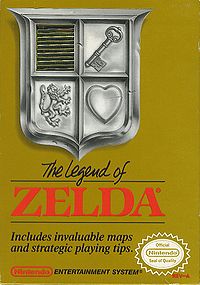| Site Notice |
|---|
|
We have a limited coverage policy. Please check our coverage page to see which articles are allowed. |
Difference between revisions of "The Legend of Zelda (game)"
m (→References) |
|||
| Line 61: | Line 61: | ||
==References== | ==References== | ||
| − | <div class="references-small" | + | <div class="references-small""> |
<references/> | <references/> | ||
</div> | </div> | ||
| Line 72: | Line 72: | ||
[[Category:1986 games]] | [[Category:1986 games]] | ||
[[Category:1987 games]] | [[Category:1987 games]] | ||
| − | |||
| − | |||
[[de:The Legend of Zelda (Spiel)]] | [[de:The Legend of Zelda (Spiel)]] | ||
Revision as of 22:14, 11 August 2015
| This article is a short summary of The Legend of Zelda (game). Zelda Wiki features a more in-depth article. |
This article is about the game. For information about the series, see The Legend of Zelda.
| The Legend of Zelda | ||||||||||||||
| THE HYRULE FANTASY ゼルダの伝説 | ||||||||||||||
| ||||||||||||||
| ||||||||||||||
| ||||||||||||||
| ||||||||||||||
|
The Legend of Zelda is an adventure game originally released for the Famicom Disk System in Japan in 1986 and later released for the standard Nintendo Entertainment System hardware in other regions the next year; it would finally also receive a Famicom release in Japan in 1994. In 2004 the game would be re-released for the Game Boy Advance under the "Classic NES Series" line of games, and finally it has been given three Virtual Console re-releases: once for the Wii in 2006, twice for the Nintendo 3DS in 2011 (Ambassadors) and 2012 (standard release), and once again for Wii U in 2013. As the first installment of The Legend of Zelda series, this game was also given a sequel, titled Zelda II: The Adventure of Link, also released for the NES in 1987/1988.
Original NES copies of the game at retail were packaged with a partial map of the game's overworld and a strategy guide.
Contents
Blurb
Nintendo eShop
Experience the original smash-hit adventure on the NES! Ganon, the King of Evil, has broken free of the Dark World and has captured Hyrule's beloved Princess Zelda. But, before she was caught, Zelda managed to shatter the Triforce of Wisdom and scatter its eight pieces throughout Hyrule. You begin your adventure by finding a small wooden sword in a dark cave. Then, as you grow in stature, experience, and strength, so do your weapons. Help Link collect the captured pieces of the Triforce, rescue the princess, and thwart Ganon's evil plans!
Story
Many years ago, the Prince of Darkness Ganon and his minions invaded the land of Hyrule and stole the Triforce of Power. Fearing Ganon's rule, Princess Zelda breaks the Triforce of Wisdom into eight pieces to keep him from obtaining it before being captured. She then sent out her nursemaid Impa to find one with the courage to defeat Ganon, though Ganon sends out his minions to stop her. As she is surrounded, however, a boy named Link appears and drives off the monsters. After Impa tells him the story, Link sets out on a quest to obtain the pieces of the Triforce of Wisdom, defeat Ganon and save Zelda[1]
Gameplay
The Legend of Zelda is a top-down adventure game in which players control Link, journeying around the land of Hyrule. Players can go to each of the eight dungeons in any order, in which players must solve puzzles to collect items or upgrades for Link, reach and defeat the boss and collect one of the eight fragments of the Triforce of Wisdom. After clearing the eight dungeons players can access the ninth level to fight Ganon. On the overworld are a number of hidden areas in which players can find Rupees for money, items or shops to buy items, and Heart Containers to increase health.
The Legend of Zelda is one of the earliest NES games to have a save feature via battery backup, allowing players to save their game when they game over, or at any point by pausing and pressing up and A with a second controller. After clearing the game, the player has the option to play "Second Quest", a more difficult game in which the dungeons are redesigned and enemies are stronger.
Technical details
|
External links
References
| ||||||
| ||||||

